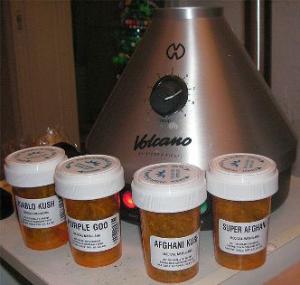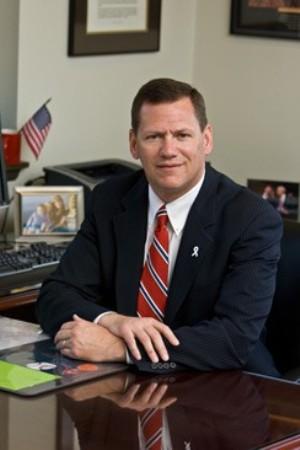The DEA and the Justice Department may have backed off -- somewhat -- on raiding medical marijuana dispensaries, but the feds have other tools in their kit, and now they're going after the banks.
A bill moving in Colorado would set threshold THC blood levels to determine whether drivers are impaired. The question is would exceeding that level cause an automatic conviction or just more evidence to convict? Right now, the bill does both.
One might have thought the Sooner state would start thinking about letting people out of prison only later, but a bill to reduce imprisonment is moving in Oklahoma City.
Delaware is one key step closer to enacting drug sentencing reform.
New York City has earned the dubious distinction of being the world's marijuana arrest capital. But such (dis)honors come at a price. A big price.
Even as the Montana Senate was killing an effort to repeal the state's medical marijuana law, the DEA was behaving as if the law had never been passed by voters in the first place.
MedicalMarijuana.ProCon.org, part of the ProCon.org family, is an in-depth web site presenting information and views from a variety of perspectives on the medical marijuana issue. The Chronicle is running a six-part series of info items from ProCon.org, and we encourage you to check it out.
Connecticut legislators pondering medical marijuana and decrim bills might want to take a look at the latest Quinnipiac poll numbers.
Oops, you accidentally shot and killed somebody. That sounds like involuntary manslaughter -- unless you're a Massachusetts SWAT team cop on a drug raid.
The Pennsylvania Supreme Court held in 2003 that schools must show a demonstrable need for drug testing students. Now, a pair of districts are being sued for requiring testing even though they have shown no need.
Honduras's first cocaine lab is discovered, a New Mexico town's mayor and police chief are arrested for alleged gun running, a former Juarez Cartel boss will stand trial, and Ciudad Juarez suffers from the continued nightmare of drug trade violence (as do many other places).
A federal judge gone wild now goes to jail, more gun running arrests pop up, and more of the same old run of the mill law enforcement corruption.
The Dutch city of Utrecht wants to let pot-smokers form co-ops to grow together, but the national government does not approve.
Events and quotes of note from this week's drug policy events of years past.
Special to the Chronicle by Clarence Walker
[Editor's Note: Houston-based crime and criminal justice journalist Clarence Walker is an occasional contributor to the Chronicle. He can be reached at [email protected].]
Federal regulators ignited a firestorm of controversy recently when they ordered banks located in the North Coast area of California to spy on transactions of customers who are suspected of making money in the marijuana business. In a bid to crack down on California's marijuana industry, regulators have ordered banks to look out for suspicious activity by those running such operations, but that is leaving legal -- under state, but not federal law -- medical marijuana businesses out in the cold.

The G-men are putting the squeeze on the banksters over pot proceeds (Image via Wikimedia)
Although DEA and FBI officials are not specifically targeting medical marijuana, they say they are looking for drug traffickers and money launderers, and they regard any marijuana-related banking activities with suspicion. The banks are not being ordered to not do business with dispensaries, but are instead closing accounts rather than put up with the hassles of investigating and reporting those transactions.
Banks in the North Coast region, including Savings Bank, Wells Fargo, the Exchange Bank, and
Ukiah Bank, as well as other financial institutions in the Sacramento and San Joaquin areas are scrambling to comply with the government's order as the feds continue their onslaught against the legal marijuana trade.
The enforcement action is the result of the North Coast's widespread reputation for marijuana production and also includes the arrest of citizens in the area operating legal medical marijuana businesses under California state law. California voters passed Proposition 215 in 1996, legalizing the medical use of marijuana for patients whose doctors have recommended they use it.
According to the
Santa Rosa Press-Democrat, the policy took effect last month when the largest bank in Mendocino County informed shareholders that federal banking regulators would now require the North Coast banks to scrutinize deposit accounts because the area had been designated a high-risk area for money laundering, particularly from those in the medical marijuana business.
"This area in general has been targeted by Washington because the amount of cash that comes out of here," said Charles
Mannon, chief executive of the
Ukiah Bank.
Mike Johnson, an entrepreneur in the marijuana industry who requested that this article not identify the name of his business, felt the squeeze from the federal regulators when Wells Fargo and the
Umpqua Bank closed his accounts last year. "They think we're all drug dealers," Johnson said.
Those in the trade familiar with the feds' regulation policy complain of how the government has forced banks and financial institutions to enlist as foot soldiers in the war on drugs. The new requirements force banks to expend unnecessary time and money probing clients' accounts for evidence of illegal activity associated with the marijuana business, they say.
To bypass the stringent rules, several banks closed the accounts of medical marijuana dispensaries. Bank officers said that since medical marijuana is a violation of federal law, they are required under the Bank Secrecy Act to report on businesses involved in the state authorized medical marijuana industry.
Last year, Exchange Bank issued a policy which prohibits medical marijuana businesses from opening up accounts because of the time-consuming scrutiny they would have to undergo and because of the expense of having to purchase pricey monitoring systems.
"State and federal law are in conflict with each other," said Bill
Schrader, president of Exchange Bank. "If there are suspicious activities under federal law, we have to report it."

No room at the bank for medical marijuana? (Image via Wikimedia)
The extensive monitoring of bank accounts works this way: If a bank agent or its anti-laundering system detects suspicious activity, the feds have required banks and credit unions to file a report with the Financial Crimes Enforcement Network (
FINCEN), which operate massive databases available to the FBI and DEA.
Currently there are 14 states including the District of Columbia allowed to sell medical marijuana legally under state law, but under the federal Controlled Substances Act of 1970, marijuana is classified as an illegal Schedule 1 drug.
The federal government cannot force states to comply with federal law or require states to enforce federal law, but the US Department of Justice has the authority to prosecute offenders and organizations in violation of federal law against sales or possession of marijuana. This law effectively blocks banks from dealing with those in the legal marijuana business who must operate business accounts to accept credit and debit cards for their services.
"Our organization is regularly contacted by cannabis businesses that can't make daily deposits or have credit card processing," Allen St. Pierre, executive director of
NORML, told the Chronicle. "The inability of
cannabusinesses to gain access to regular banking and financial services continues to hamper the expansion of medical cannabis dispensaries."
St. Pierre took a shot at the Department of Justice. "Despite the 2009 'Ogden' memo from the Obama administration's attempt to allow greater autonomy for states to regulate medical cannabis, the memo didn't address the legal concerns expressed by banks and financial services who fear they are violating federal laws if they do business with cannabis businesses."
In May 2010, following several attempts to pass legislation to eliminate federal penalties for medical marijuana, 15 members of Congress, led by Rep. Barney Frank (D-MA) issued a letter written by Rep. Jared
Polis (D-CO) to Treasury Secretary Timothy
Geithner.
"Legitimate state-legal businesses are being denied access to banking services, which does not serve the public interest," the letter said. The letter also requested "formal written guidance" to assure banks would not be federally targeted for conducting business with medical marijuana dispensaries.
"They were trying to ensure that medical marijuana dispensaries could have banking services provided to them because there's so much capital involved," said Mike Meno, director of communications for the
Marijuana Policy Project.
It's not just Northern California. Sue Harank is the co-owner of Alpine Herbal Wellness in Denver Colorado. This medical marijuana dispensary has been operating less than a year. Within this time, Harank has been forced to switch banks four times after the institutions closed her accounts without prior warning.
Harank called situation as "one heck of a nightmare." According to
Banktime.com, Harank now does business with Colorado State Bank, the only bank in the state allowing people in the legal marijuana trade to hold business accounts.
Don Duncan feels the adverse treatment as well, when dealing with financial institutions. Duncan, the California director of the pro-medical marijuana advocacy group
Americans for Safe Access, had his bank accounts shut down without notice. "Banks can't figure out if it's okay to do business with medical cannabis organizations," he said.
US Attorney General Eric Holder issued a memo in October, 2009, expressing administration policy of not utilizing federal resources to pursue "individuals whose actions are in clear and unambiguous compliance with existing state laws providing for the medical use of marijuana." Despite Holder's direct orders the federal troops still pursue those legally operating marijuana businesses.
"It doesn't make sense. It is an un-American thing for the feds to do," said Mike Johnson. "Every major bank in California has been told not to handle marijuana accounts."
Legal conflicts surrounding the bank's secrecy laws forcing banks to report customers making suspicious deposits has created a "boom" in business for lesser known financial services. According to Banktime.com,
Marijuanapos.com is one of the few institutions to offer banking services, including credit and debit card processing, for legal marijuana businesses.
Jesse Cretaro, the marketing director of Marijuanapos.com, said they work with banks that deal with high-risk clients. Another financial service, Direct Bancard of Livonia, Michigan, offers medical marijuana providers a prime-time Cadillac service. Executive Vice President Martin Khemmoro explained that Direct Bancard often uses merchant services located overseas to bypass legal conflicts.
Guardian Data Systems offer similar services but deals only with medical marijuana dispensaries legal under California state law. Lance Ott, Guardian's chief executive officer said he's been trying for years "to offer honest and secure services to an emerging industry."
Meanwhile dedicated advocates for the medical marijuana industry insist that all they want is for those in the industry to have access to safe and transparent banking services, like other professional entrepreneurs.
"All medical marijuana merchants wants to do is obey the law and do what's normal," said Duncan.
But that's unlikely to happen as long as federal marijuana prohibition remains intact. While the federal raids on medical marijuana dispensaries have decreased -- if not ended completely -- the feds have demonstrated that they are determined to use all the weapons in their arsenal to continue to go after what they consider to be a criminal industry.
back to top
A bill aimed at stoned driving currently working its way through the Colorado legislature would set a blood THC level above which drivers would either be presumed to be impaired or deemed impaired per se, meaning the simple fact that their THC levels surpassed that threshold would make them guilty of DUID with no other evidence needed. The state's medical and recreational marijuana users and advocates are apprehensive -- although to varying degrees -- but they are also confused.
The apprehension is over fears such a law could unjustly impact medical marijuana patients and recreational users who are not actually impaired; the confusion is because the bill,
House Bill 1261, contains two different responses to drivers' testing above the specified level -- at this point, five nanograms of THC per liter of blood.
"I don't even know what the hell that means," sputtered Boulder attorney Lenny Frieling, who has tracked the bill closely as it advances. "It's internally inconsistent. If they don't fix this, I can't wait to take a case on it," he said.
The bill, introduced by Reps. Mark Waller (R) and Claire Levy (D) passed out of the House Judiciary Committee a week ago. The contradiction was supposed to have been resolved in the committee, but that didn't happen.
"As of today, we still have both in there," said Freiling. "Levy was unable to get someone on the committee to remove the per se language for now, so now she's looking to change the threshold level from five nanograms to eight."
There is apprehension about both any effort to set a THC level defining impairment and about the per se language in particular. That was evident at last week's hearing, where some patients and advocates lashed out at the bill.
"Clearly, we see it as a witch hunt on medical marijuana patients," Laura Kriho, a spokeswoman for Colorado's
Cannabis Therapy Institute, told the committee.
The per se language drew the attention of patient Max Montrose, 22. "They have the potential of incriminating thousands of people who are innocent," he testified.
"While the science that is out there seems to support this five nanogram limit, we have concerns that patients who use a fair amount of marijuana legally may be caught up in this dragnet if they have high THC levels," said Brian Vicente of
Sensible Colorado. "That's not an insignificant concern in a state where 2% of the population hold medical marijuana cards."
Other activists were a bit more sanguine. "Some people are fearful that patients in states like Colorado would constantly have THC levels close to or above the threshold simply by their self-medicating," said Paul Armentano, deputy director of
NORML and arguably the drug reform movement's leading expert on drugged driving issues. "But we don't have the data to establish that is the case right now. There is very limited data to support that supposition."
Armentano pointed to the experience of other states that have both medical marijuana and per se marijuana DUI laws. "Rhode Island, for example, has a zero tolerance per se law, yet we do not get a lot of complaints from patients there saying police are abusing the law," he said.
"There's a lot of confusion about what this bill will actually mean," said Mason Tvert of Denver-based
SAFER (Safer Alternatives for Enjoyable Recreation). "It's still being tinkered with, and amendments are being proposed, so there are likely to be some changes in the bill, but I don't really think it's going to change anything. It's already illegal to drive under the influence of marijuana, and it will still be illegal. This seems to be more of a way for the politicians to say they're doing something about this."
At least a dozen states have per se DUID marijuana laws, all but three of them zero tolerance laws, meaning any THC presence is grounds for a conviction. In two states, Nevada and Ohio, the per se threshold is set at two nanograms, while in Pennsylvania, it is set at five.
"Plenty of people in Pennsyvlania use marijuana, and we just have not seen that many complaints or criticisms of that law from the cannabis community there that the law is being abused or routinely netting cannabis consumers," said Armentano.
Setting a five nanogram threshold for marijuana impairment is reasonable, said Armentano."The scientific evidence shows that there is a rational basis to infer that an individual who tests positive at five nanograms may be under the influence of marijuana," he said. "That's not to say there should be a one size fits all standard. That's why it's so important to delineate between a per se law and a law that allows prosecutors, the defense, and the jury to assess the totality of the circumstances."
As to how long after smoking it takes for blood THC levels to dip beneath five nanograms, well, that depends, said Armentano. "Do you have residual levels? What was the potency of the marijuana?" he asked. "We know that among occasional users, blood levels fall below five nanograms within one to three hours after inhalation, but that's with relatively low potency marijuana."
Less is known about chronic pot smokers, but Armentano cited a NIDA-backed study that found out of 23 subjects, only one tested above five nanograms after 24 hours and only two more tested above one nanogram. "We can't say definitively how much time it would take, but based on the available evidence, most people would be below five nanograms within a few hours after last smoking."
While NORML has spent some resources on influencing the bill, it officially neither opposes nor supports it, Armentano said. "Our focus is to make sure this legislation is not ultimately a per se law, but one that simply sets guidelines that can be used in determining impairment," he said.
There is still time to do that. While the bill seems likely to pass in some form, it still faces another committee vote in the House, and the Senate has yet to take it up. That means there is still time to try to influence the
final outcome.
"The one area where we think we can get some movement is to target our lobbying and testifying to try to push for a rebuttable presumption in the law that would allow patients to put forth their argument that if they use marijuana in a certain way, they shouldn't be convicted," he said. "We would encourage concerned patients and advocates to reach out to the legislature and push for the rebuttable presumption -- that's damage control for a bill that's going to pass."
But the still existing per se language now presents another target for advocates and activists. In the end, it may come down to some legislative horse-trading. Will the legislature raise the threshold limits, but keep the per se language, or vice versa?
back to top
The Oklahoma House of Representatives Tuesday overwhelmingly approved a bill designed to relieve prison overcrowding. The bill, House Bill 2131, would substantially change the way Oklahoma sentences and paroles nonviolent offenders and it is estimated that it will save taxpayers tens of millions of dollars in coming years if it is enacted into law.

Who would have thunk it? Corrections reform is moving in Oklahoma. (Image via Wikimedia)
The bill changes "default" sentencing from consecutive to concurrent terms, which would substantially reduce the length of prison stays. Under the bill, instead of automatically sentencing offenders to consecutive terms, judges or prosecutors must specify that the terms must run consecutively.
The bill also changes the parole process by eliminating the need for the governor to approve parole for nonviolent offenders. Currently, Oklahoma requires the governor to sign off on every parole. Under the bill, if the governor does not act on a nonviolent offender parole request within 30 days, parole will be granted.
The bill also would expand eligibility for community sentencing programs and GPS monitoring for certain low-risk offenders.
"These changes would result in the better use of taxpayer dollars, increase in public safety and more appropriate consequences for low-risk offenders," said House Speaker Kris Steele (R). Changing default sentencing unless a judge or district attorney objects means "the standards will be that the sentences will run concurrently and that will ultimately save money," Steele said.
The bill passed 87-4 with no debate and no questions. It now heads to the state Senate.
back to top
The Delaware House of Representatives Tuesday overwhelmingly approved a comprehensive drug sentencing reform bill. The bill, House Bill 19, would, most notably, make simple drug possession offenses misdemeanors. Drug possession is currently a felony.

Drug sentencing reform is moving in Dover. (Image via Wikimedia)
It also does away with the current possession with intent to distribute and distribution offenses and replaces them with aggravated possession and drug dealing. Judges would exercise more discretion in sentencing, with sentences being increased if certain aggravating factors, such as proximity to a school or the involvement of juveniles, are present.
The bill also reduces the size of "drug-free zones" near schools, day care centers, or churches from 1,000 feet to 300 feet. It removes proximity to a church as an aggravating factor if the church does not have a school or day care center.
On the other hand, the bill creates a new felony offense of possessing firearms while possessing drugs. It also increases penalties for dealing prescription drugs.
The bill passed the House 39-1. It now goes to the state Senate.
back to top
In a report released Tuesday, the Drug Policy Alliance charged that New York City's unwritten policy of mass arrests of pot smokers -- overwhelmingly young and minority -- is costing the city $75 million a year. The report, bluntly titled $75 Million a Year: The Cost of New York City's Marijuana Arrests, was co-authored by City University of New York professor and marijuana arrest expert Harry Levine.

drug arrest scene, "10 Rules for Dealing with Police," flexyourrights.org
Although New York state decriminalized marijuana possession in the 1970s, the NYPD has made it a practice to stop and frisk people by the hundreds of thousands a year and demand that they empty their pockets. When they produce marijuana from their pockets, they are then charged with public possession -- possession in plain view -- a misdemeanor.
The NYPD is arresting about a thousand pot smokers a week and has busted more than 350,000 of them during Mayor Michael Bloomberg's tenure in office. This is the same Mayor Bloomberg who once said he smoked marijuana and like it.
Bloomberg's and the NYPD's mass arrest policies cost the city big bucks in a time of economic difficulty. With Levine and his co-author Loren Siegel estimating the cost of arresting and prosecuting each pot possession offender at between $1,000 and $2,000, New York City has spent somewhere between $350 million and $700 million to persecute pot people since Bloomberg has been in office.
"More people have been arrested for marijuana possession under Mayor Bloomberg than under Mayors Koch, Dinkins, and Guiliani combined," said Levine at a City Hall news conference Tuesday. "These arrests are wildly expensive, do not improve public safety, and create permanent criminal records which seriously damage the life chances of the young people targeted and jailed," Levine said.
"Upwards of $75 million have been used to arrest NYC residents for marijuana possession that could have legally been handled with a summons and not a criminal offense," said City Council Member Jumaane Willimas. "This, as we are debating closing our senior centers. In addition, 86% of those arrests are young children of more color. I don't believe that this represents the percentage of people who take the occasional 'pull.' It does however better reflect the communities abused by the current stop and frisk policies. Had this been 86% of our young children of a lighter shade, there would be uproar. I believe there still should be. All of our children are gifts to be nurtured; yet we are losing them to the system at an alarming rate. There must be a better way to deal with drugs in New York City. These arrests are simply about boosting arrest numbers and aren't the answer to our problems," said Williams.
"It is clear that the NYPD's current policy of giving high arrest priority to marijuana enforcement is fiscally wasteful, and has a greater impact on low-income communities where the 'war-on-drugs' has been primarily focused," said Council Member Letitia James. "Although African-Americans only constitute 13% of national of drug users, they make up 38% of those arrested for drug offenses, and 59% of those convicted of drug offenses. It is fair to say that the high priority given to marijuana enforcement directly relates to racial profiling in New York."
"The consequences of an arrest are severe, especially for young people of color who are already disproportionately arrested and incarcerated in juvenile facilities," said Kyung Ji Rhee, Director of the Institute for Juvenile Justice Reform and Alternatives. "Young people of color are targeted, illegally searched and being put through the criminal justice system for possessing or smoking marijuana. Whatever your opinion may be on marijuana, this is no way to treat or teach young people about the choices they make."
"It is beyond hypocritical for the Mayor, who once said he smoked marijuana and enjoyed it, to make arresting young people of color for marijuana possession his top law enforcement priority," said Gabriel Sayegh, New York State Director for the Drug Policy Alliance. "While cutting services for seniors, youth, housing, transportation, teachers, education, and more, the Mayor spent S75 million last year to arrest over 50,000 people for marijuana possession -- which isn’t even a crime under NY State law. It's just outrageous."
Will Mayor Bloomberg and the NYPD see the light? Not without some political heat -- stay tuned.
back to top
A move to repeal Montana's voter-approved 2004 medical marijuana law died in a state Senate committee Monday on a tie vote. The measure had passed the House, but members of the Senate Judiciary Committee said what was needed was regulation, not repeal.

Neither Montana's reactionaries nor the DEA can make medical marijuana go away. (Image courtesy Coaster420)
After the vote, committee Chair Terry Murphy (D-Cardwell) appointed a three-member subcommittee to work on a bill to tighten regulations over marijuana. But another legislative committee has already crafted regulatory legislation that is working its way through the legislature.
Even as senators were debating the measure, the DEA and other federal law enforcement agencies assisted by local law enforcement conducted raids against at least 10 medical marijuana dispensaries or grow operations across the state.
One business hit was the Montana Cannabis greenhouse near Helena, where the company grows more than 1,600 plants to supply its four dispensaries across the state. DEA and FBI wearing respirators conducted the raid while sheriff's deputies and Helena Police stood guard. The company's four dispensaries were all hit, too.
"They came in guns drawn, got us down on the ground, and in cuffs as fast as they could," Montana Cannabis employee Brett Thompson told the
Associated Press. No arrests were made, except for one person wanted on an outstanding warrant.
A search warrant for a raid in Bozeman listed 13 items to be seized in an investigation of "drug trafficking," including cash, plants, products, computers, and data storage devices. But the affidavit used to obtain the search warrant, which would provide some basis for alleging criminal offenses had taken place, has not been released.
The Obama Justice Department in October 2009 sent a policy memo to all US Attorneys directing them to not use their resources against medical marijuana patients and providers complying with state law in states where it is legal. But in Montana, as well as other medical marijuana states including Michigan, Nevada, and Washington, dispensaries have opened without being explicitly protected by state law. The Montana law allows caregivers to provide marijuana to patients and receive compensation, but does mention dispensaries. The fix is in the legislature, as was the case in Colorado.
back to top
Did you know there are three pharmaceutical medications that are derived from or synthetically duplicate components of cannabis (marijuana), and eleven others that are based on cannabis?
Read the details at Pharmaceutical Drugs Based on Cannabis, on the web site medicalmarijuana.procon.org, part of the ProCon.org family.
Follow Drug War Chronicle for more important facts from ProCon.org over the next several weeks, or sign up for ProCon.org's email list or RSS feed.
Read the first ProCon.org blurb in this six week series.
ProCon.org is a web site promoting critical thinking, education, and informed citizenship by presenting controversial issues in a straightforward, nonpartisan primarily pro-con format.

back to top
A Quinnipiac University poll released March 10 showed strong support for medical marijuana and marijuana decriminalization among Connecticut voters. The poll comes at state legislators consider medical marijuana and decriminalization bills.

The plant is getting popular in Connecticut (Image courtesty of the author)
Medical marijuana had the support of a whopping 79% of respondents. Support was above 70% in every demographic, with even 72% of Republicans favoring it.
"There is a near consensus on the medical marijuana law with about eight in 10 voters supporting it," said Quinnipiac poll director Dr. Douglas Schwartz. "It's rare to see such a level of support for any issue."
Support for pot decriminalization wasn't as overwhelming, but still high -- and trending upward. Decriminalization was supported by a two-to-one margin, with 65% in favor and 32% opposed. That's up seven points from the 58% who supported it in last year's March Quinnipiac poll.
Decriminalization was also supported by every demographic, with even 53% of Republicans and 58% of voters over age 64 in favor. Support was at 70% among Democrats and voters 18 to 34 years old.
The poll was conducted March 1 through 7 by surveying 1,693 registered voters. The poll used live interviewers and called both land lines and cell phones. It a margin of error of +/-2.4% percentage points.
Connecticut voters have clearly signaled in this poll their policy preferences on medical marijuana and decriminalization. Now, let's hope the state legislature, and especially key committee chairs, are paying attention.
back to top
The Framingham, Massachusetts, SWAT team officer who shot and killed a 68-year-man lying prostrate on his apartment floor during a drug raid will face no criminal charges. The killing of Eurie Stamps was an "accident," according to a Wednesday report from the office of Middlesex County District Attorney's Gerard Leone.

DA Leone couldn't come up with a criminal charge (Image courtesy Middlesex County District Attorney's Office)
The report named the shooter as Officer Paul Duncan, who was part of a SWAT team enlisted to take part in a drug raid aimed at Stamps' grandson, Joseph Bushfan. Police arrested Bushfan outside the home before kicking down the door, throwing a stun grenade, and ordering everyone to the floor. Stamps had obeyed and was lying on the floor when Duncan attempted to cuff and frisk him.
"As he stepped to his left, (Duncan) lost his balance and began to fall over backwards," the report said. "Officer Duncan realized that his right foot was off the floor and the tactical equipment that he was wearing was making his movements very awkward. While falling, Officer Duncan removed his left hand from his rifle, which was pointing down towards the ground and put his left arm out to try and catch himself. As he did so, he heard a shot and then his body made impact with the wall. At that point, Officer Duncan, who was lying on the ground with his back against the wall, realized that he was practically on top of Mr. Stamps and that Mr. Stamps was bleeding. Officer Duncan immediately started yelling 'man down, man down.' Numerous SWAT members began calling for medics and alerting team members that there was a person down that needed medical attention. Officer Duncan told another officer on scene within moments of the incident that he had stumbled and lost his balance while moving to get in a better position, and as he was falling, his gun fired."
That was good enough for DA Leone: "The conclusion of this office is that the actions of Officer Duncan do not rise to the level of criminal conduct, and the shooting death of Eurie Stamps was an accident."
But it wasn't good enough for Stamps' family members and their attorneys. Both Stamps' widow and his children are pondering lawsuits in the case.
"Eurie Stamps’ death was the result of a fundamentally unjustifiable shooting by law enforcement officers who are charged with protecting public safety," said Anthony Tarricone, a lawyer representing Stamps’ children. "When an innocent man dies this way at the hands of police, there really are no excuses that can satisfactorily explain away such a tragedy," he told the
Boston Herald.
"I don’t think it's right," said Adia Boston, Stamps' niece by marriage. "I think he should be suspended, at a minimum. There should be job loss, if not jail. That wasn't an accident... It shouldn't be an accident if it's the SWAT team. They're supposed to be trained."
Joseph Bardouille, the attorney representing Stamps' widow, said that the district attorney's report did not address serious questions about the shooting and that the family is undertaking a civil rights investigation.
"One of the purposes of the family's inquiry is to make sure SWAT officers throughout the commonwealth are trained," Bardouille said, noting experts have told him an officer's finger should not be on the trigger unless he is prepared to shoot. "They want to prevent something like this from happening again."
Officer Duncan remains on paid administrative leave while the Framingham Police Department finishes its investigation of the incident.
A civilian who shot an innocent man in these circumstances would be likely to face involuntary manslaughter charges at the least. But that is not the case when law enforcers investigate themselves.
back to top
The ACLU and a Philadelphia law firm are suing two Pennsylvania school districts for maintaining random drug and alcohol testing of students who participate in extracurricular activities or who drive cars to school. The separate lawsuits were filed last week.

Some educators require remedial litigation to ensure they understand their students' privacy rights. (Image courtesy DVSD)
The US Supreme Court has held that the random drug testing of student athletes or students involved in extracurricular activities does not violate the US Constitution. But some state supreme courts, including Pennsylvania's, have found protections against random drug testing of students in their state constitutions.
The lawsuits filed by the ACLU of Pennsylvania and the law firm Dechert LLP charge that the school districts have maintained student drug testing policies that violate a 2003 Pennsylvania Supreme Court decision holding that random drug testing of students is unconstitutional unless the school districts can show that the group of students being tested had a high drug use rate. That case was
Theodore v. Delaware Valley School District.
Delaware Valley is one of the districts named in the law suit. The other is the Panther Valley School District. Read the respective complaints
here and
here.
Delaware Valley, the defendant in the 2003 case, has never changed its policy, the complaint said. Instead, the district has "essentially ignored that ruling and continued to enforce the drug testing policy." The district has never attempted "to compile data that would support or refute a need for the policy" even though the Supreme Court held that any such policy "must be born out of a true and documented need for random testing of the student population affected."
The plaintiffs in the Delaware Valley lawsuit are Glenn and Kathy Kiederer and their two daughters, identified only by their initials. The Kiederers complain that when their daughters refused to sign drug testing consent forms, they were excluded from participating in athletics and extracurricular activities, ironically including joining the school's Junior Students Against Drug Abuse.
"We are very frustrated that the Delaware Valley School District has ignored the State Supreme Court's guidelines and has refused to change the drug testing policy to comply with the court opinion. We feel that the proper education for our children is to teach them to defend their constitutional rights, especially in the present times we are living in," said the Kiederers.
The Panther Valley suit was filed on behalf of high school senior Jeremy Thomas and his ninth-grade sister, identified only by her initials. According to the complaint, Thomas, an Eagle Scout and Junior ROTC member, was thrown off the school golf team after refusing to sign a consent form. He was also barred from attending the senior prom. Thomas's parents, Morgan and Donna, said in the lawsuit they refused to sign the consent form because they believe the drug testing program violates their son's right to privacy.
"These policies teach young people to accept extreme invasions of their privacy when they've done nothing wrong," said Mary Catherine Roper, senior staff attorney at the ACLU of Pennsylvania and one of the attorneys representing the students and their parents. "Random drug testing is also counterproductive, as studies have shown that extracurricular activities help students avoid drug use. Schools should not be putting up barriers to students' participation in after-school activities," she continued.
Neither school district has yet responded publicly to the lawsuits.
back to top
by Bernd Debusmann, Jr.
Mexican drug trafficking organizations make billions each year smuggling drugs into the United States, profiting enormously from the prohibitionist drug policies of the US government. Since Mexican president Felipe Calderon took office in December 2006 and called the armed forces into the fight against the so-called cartels, prohibition-related violence has killed more than 36,000 people, including more than 15,000 last year. The increasing militarization of the drug war and the arrest of dozens of high-profile drug traffickers have failed to stem the flow of drugs -- or the violence -- whatsoever. The Merida initiative, which provides $1.4 billion over three years for the US to assist the Mexican government with training, equipment and intelligence, has so far failed to make a difference. Here are a few of the latest developments in Mexico's drug war:

Ciudad Juarez
In Honduras,
authorities discovered a cocaine lab which was used to process up 200 to 400 kilos of cocaine a week. The lab – which processed cocaine paste into powdered cocaine hydrochloride – is the first of its kind discovered in Honduras, and among the first discovered in Central America. Honduran officials have suggested that the lab might have belonged to El Chapo Guzman’s Sinaloa Cartel.
Thursday, March 10
In Columbus, New Mexico,
the mayor and police chief were arrested along with nine other suspects for allegedly running guns to Mexico. According to the 84-page indictment, Columbus mayor Eddie Espinoza and the other suspects trafficked some 200 firearms to Mexico, including a shortened AK-47 variant. Columbus is just across the border from Palomas, Chihuahua, which has seen high levels of drug-related violence.
In Ciudad Juarez, former army office and Tijuana police chief
Julian Leyzaola took command as police chief. He is widely credited with bringing down the level of drug-related crime in Tijuana, but has been criticized for violating the human rights of officers he thought to be corrupt.
Three days after taking office, a man (who had been tortured but was alive) was found wrapped in a blanket
alongside a note welcoming Leyzaola to Ciudad Juarez. The note was signed by the Sinaloa Cartel, which is battling the Juarez Cartel for control of the cities drug trafficking routes and distribution points.
In Ciudad Juarez,
five people were murdered in several incidents. In one incident, a federal police officer was gunned down as he left his home. According to researcher Molly Molloy, these killings bring the number of dead in Ciudad Juarez to 8,000 since January 2008.
Saturday, March 12
In Ciudad Juarez,
eight people were murdered. In one incident, a man escaped gunmen who attacked his home, but was later discovered hiding in the bathroom of a nearby business and shot dead. A 58-year old woman who owned the business was also gunned down. In another incident, a security guard was dragged from his car and shot dead in front of his infant son.
In San Fernando, Tamaulipas,
eight suspected Zetas were killed during an army raid on an armed camp. Nine others were captured, and 12 vehicles, weapons, uniforms and 150 pounds of marijuana were seized. One of the captured individuals said she had been held captive at the camp.
In Guamuchi, five people were killed at a wake for a young man who was recently murdered in Nayarit. Initial reports indicated that at least a dozen SUVs full of gunmen were involved in the attack. One of the victims appears to have been the father of the man killed in Nayarit."
Tuesday, March 15
In Mexico City,
a judge decreed that the son of a former Juarez Cartel boss is to stand trial on Monday
laundering charges. Vicente Carillo Fuentes is the son of Amado Carillo Fuentes, who led the Juarez Cartel under his death in a botched plastic surgery operation in 1997. His uncle, also named Vicente, is the current leader of the cartel.
In Nuevo Laredo, Tamaulipas, a female
prison warden died after being stabbed repeatedly by an inmate. Warden
Rebeca Nicasio’s predecessor disappeared last December after 150 inmates escaped from the same prison under mysterious circumstances.
Total Body Count for the past two Weeks: 341
Total Body Count for the Year: 1,661
Total Body Count for 2010: 15,273
Total Body Count for 2009: (
approx.) 9,600
Total Body Count for 2008 (
approx.): 5,400
Total Body Count for 2007 (
approx): 4,300
Total Body Count for Calderon's drug war through 2010: 34,849
Total Body Count for Calderon's drug war to date: 36,510
back to top
A federal judge gone wild now goes to jail, more gun running arrests pop up, and more of the same old run of the mill law enforcement corruption. Let's get to it:

Prohibition's filthy lucre is hard for some to resist. (Image via Wikimedia)
In Atlanta,
a former federal judge was sentenced last Friday to 30 days in jail for doing drugs and partying with a prostitute. Then senior federal Judge Jack Camp was arrested in October in an undercover drug sting. Camp went down after he started partying with an exotic dancer in May and paid her for sex. Together, they also partied with pot, cocaine, and
opioids, but by October, the dancer was cooperating with undercover FBI agents who set up a sting. Camp gave the dancer $160 to buy drugs and was in the car with her when she made the purchase from an undercover agent. Camp must also pay a $1,000 fine, do 400 hours of community service, and reimburse the government for the cost of prosecution.
In Brownsville, Texas,
a former Cameron County sheriff's deputy was sentenced Monday to 57 months in federal prison after pleading guilty to gun smuggling charges. Jesus Longoria, 31, had admitted that while assigned to a border bridge in May, he attempted to export 13 semi-automatic firearms from the US to Mexico. The weapons were destined for a Mexican drug cartel, and Longoria was paid $5,400 for letting them through. He resigned as a deputy on the day he was arrested.
In Star City, Arkansas,
a former King County, Washington, narcotics detective was arrested March 9 on charges he stole drugs that were intended as training aids for his drug dog.
Kristopher Kizer was arrested by US Marshals as he arrived at the local county sheriff's office to apply for a job. He is charged with theft and felony possession of narcotics. He had resigned from the force in February, and after his resignation, detectives realized that seized cocaine and methamphetamine samples supplied to him for training had never been returned. He is also accused of failing to log in marijuana seized in a traffic stop.
In Wilkes-Barre, Pennsylvania,
four current or former Luzerne County Prison employees were arrested March 10 for smuggling drugs into the jail. Arrested were jail guards Jason Fierman, 35, and Christopher Walsh, 28, and former jail nurse Kevin Worman, 50, and former guard captain John Casey, 37. They went down after a 13-month investigation into cocaine and prescription drug trafficking inside and outside the county jail that started with anonymous tips that people were bringing contraband into the facility. Warman is accused of using fictitious names to write prescriptions, which he would then pass out to his fellow jail workers. Carey is accused of receiving deliveries of cocaine from jail employees and former inmates, as well as being connected to the Outlaws Motorcycle Club members arrested in a 2009 drug sting. Warman is charged with one count of delivery of a controlled substance and one count of acquisition or obtaining a controlled substance by misrepresentation, fraud, forgery, deception or subterfuge. Carey is charged with one count each of delivery of cocaine and possession of cocaine. Fierman is charged with one count each of delivery of a controlled substance, possession of a controlled substance and conspiracy to deliver a controlled substance. Walsh is charged with one count each of delivery of a controlled substance, possession of a controlled substance and conspiracy to deliver a controlled substance.
In Columbus, New Mexico,
the city mayor and police chief were among 10 people arrested March 10 on charges they trafficked firearms to Mexican drug cartels. Columbus Mayor Eddie Espinoza and Police Chief Angelo Vega went down after an intensive yearlong investigation initiated by the Bureau of Alcohol, Tobacco, Firearms and Explosives and ICE Homeland Security Investigations, that later expanded to include the Drug Enforcement Administration and the U.S. Attorney's Las Cruces Branch Office. They are accused of purchasing about 200 firearms favored by cartel hit men, including 40 AK-47-style pistols by falsely claiming they were the actual buyers of the weapons, when in fact they were only "straw buyers" acting on the behalf of others. Espinoza and Vega are charged along with all the other defendants with conspiracy to smuggle firearms into Mexico and with making false statements in connection with the purchase of firearms.
In Baltimore
, a Prince George's County police officer was indicted Monday on updated federal drug conspiracy charges as well as new charges of extortion under color of official right in a scheme to bribe police to use their positions to ensure the safe transit and sale of untaxed cigarettes. Officer Sinisa Simic was originally charged with conspiracy to traffic cocaine and carrying a firearm during the commission of a drug trafficking offense.
back to top
The Dutch city of Utrecht wants to experiment with letting marijuana smokers grow together in co-ops in a bid to improve public health and safety, but the Dutch government is warning against the idea.

Looking old but thinking new in Utrecht (Image via Wikimedia)
The Netherlands tolerates the possession and sale of small quantities of marijuana and allows individual users to grow up to five plants for personal use. But the mass production of marijuana is illegal and puts big bucks in the pockets of organized crime groups.
"We want to tackle this in the experiment. If you have some users grow the cannabis you remove it from the criminal and illegal scene," Utrecht's alderman Victor Everhardt told Dutch public broadcaster NOS on Thursday.
Controlled cultivation would also guarantee quality control and reduce health hazards, Everhardt said.
A Utrecht city council spokeswoman told the
Netherlands Information Service the council expects 100 to 150 pot-smokers to be involved and that the experiment should be carried out during the current council's term. She added that plans are in an early stage and more details would be forthcoming.
But the Dutch Ministry of Security and Justice told
Reuters the plan was illegal and would be prosecuted if implemented. "The soft drugs policy does not allow for the collection of plants and to grow, for instance, 500 plants," the ministry spokesman said.
That's not surprising from a conservative coalition government that for the past several years has been closing down as many of the country's famous cannabis coffeehouses as it can and is attempting to limit the sale of marijuana to foreigners.
back to top
March 18, 1839: Lin Tse-Hsu, the imperial Chinese commissioner in charge of suppressing the opium traffic, orders all foreign traders to surrender their opium. In response, the British send expeditionary warships to the coast of China, initiating the First Opium War.
March 22, 1972: The Richard Nixon-appointed, 13-member National Commission on Marijuana and Drug Abuse recommends the decriminalization of marijuana, concluding, "Marihuana's relative potential for harm to the vast majority of individual users and its actual impact on society does not justify a social policy designed to seek out and firmly punish those who use it."
March 19, 1983: Best known for her role in Just Say No, First Lady Nancy Reagan appears on the NBC sitcom Diff'rent Strokes, declaring: "Let me tell you a true story about a boy we'll call Charlie. He was only 14 and he was burned out on marijuana... One day, when his little sister wouldn't steal some money for him to go and buy some more drugs, he brutally beat her. The real truth is there's no such thing as soft drugs and hard drugs. All drugs are dumb... Don't end up another Charlie."
March 23, 1983: Vice President George Herbert Walker Bush is placed in charge of the National Narcotics Border Interdiction System, which was supposed to staunch the drug flow over all US borders. Twenty-six years later drugs continue to be widely available throughout the United States.
March 17, 1999: A report by the Institute of Medicine – part of the prestigious National Academy of Sciences – for the Office of National Drug Control Policy states that "there is no conclusive evidence that the drug effects of marijuana are causally linked to the subsequent abuse of other illicit drugs" and "scientific data indicate the potential therapeutic values of cannabinoid drugs for pain relief, control of nausea and vomiting, and appetite stimulation."
March 19, 2001: Mexican President Vicente Fox is quoted in the Associated Press: "[T]he day that the alternative of freeing the consumption of drugs from punishment comes, it will have to be done in the entire world because we are not going to win anything if Mexico does it, but the production and traffic of the drugs... to the United States continues. Thus, humanity will one day view it [legalization] as the best in this sense."
March 20, 2002: Reuters reports that British scientists found that motorists who smoke a cannabis joint retain more control behind the wheel than those who drink a glass of wine. Research from Britain's Transport Research Laboratory showed drivers found it harder to maintain constant speed and road position after drinking the equivalent of a glass of wine than after smoking a "spliff."
March 21, 2003: President Bush announces his intention to nominate Karen P. Tandy to be the Drug Enforcement Administration's new administrator. Tandy served in the Department of Justice (DOJ) as Associate Deputy Attorney General and Director of the Organized Crime Drug Enforcement Task Force. She also previously served in DOJ as Chief of Litigation in the Asset Forfeiture Office and as Deputy Chief for Narcotics and Dangerous Drugs. Earlier in her career, she prosecuted drug, money laundering, and forfeiture cases as an Assistant United States Attorney in the Eastern District of Virginia and in the Western District of Washington.
back to top














